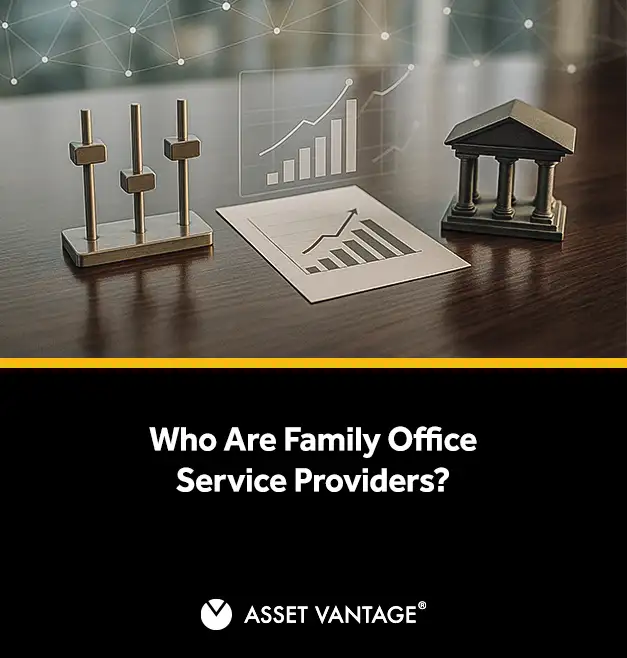Read Time8 Mins
Who Are Family Office Service Providers?
Family office service providers are specialist teams that bring structure to family wealth.
Common elements of credible providers
- Controls and reporting: accounting hygiene, consolidated reporting, reconciliations, and internal controls that reduce errors and blind spots.
- Governance and education: facilitation of councils and policies, with next-generation financial education so new stewards can act with context.
- Privacy and risk: role-based access, data segregation with external advisors, and clear protocols for cyber and vendor risk.
- Investment oversight linkages: alignment with investment policy, documentation of investment advice, and coordination across managers, including those managing alternatives.
- Operator cadence: clear routines for closes, approvals, and exception handling that work in single-family and multi-family contexts.
Categories of Family Office Service Providers
Banks and Wealth Managers
- Global custody, brokerage, lending, and FX.
- Access to managers with documented investment advice and policy benchmarks
- Curated deal flow in specific strategies and markets
- Performance reporting is mapped to investment policy statements
- Risk and compliance coordination with family office executives
Boutique and Specialized Consulting Firms
- Tax planning, entity hygiene, and cross-jurisdiction filings
- Estate and trust architecture with governance charters
- Alternative investments due diligence, memos, and documentation
- Risk management frameworks and internal controlsets
- Next-generation financial education aligned to family values
Multi-Family Office Service Providers
Typical services
- Consolidated reporting across banks, managers, and entities
- Cash management, bill pay, and vendor coordination
- Investment oversight against policy and risk tolerance
- Philanthropy administration and non-profit governance support
- Education programs and succession planning for next-generation stewards
Technology Platforms and Advisors
Typical services
- Data aggregation, reconciliations, and real-time dashboards
- Role-based permissions, immutable logs, and exportable data
- Anomaly detection with AI-assisted insights for review
- Cyber-risk safeguards and vendor access governance
- Investment-policy surveillance alerts tied to investment management thresholds
Comparing Different Provider Models
Service Providers vs Single Family Offices
- Keep investment policy and approvals with the family; outsource execution for coverage and speed.
- Benchmark risk tolerance with external datasets; record policy changes in writing.
- Codify processes so knowledge survives turnover on both sides.
- Ring-fence privacy using role-based permissions and explicit data-return terms.
- Ask for tailored solutions in reporting and controls, not generic service menus.
Multi-Family Office Providers vs Private Banks
- Separate advice from product to reduce bias in recommendations.
- Map permissions and segregation across multiple families and entities to keep privacy intact.
- Align investment management to the written policy; require audit-ready documentation.
- Use consolidated reporting to shorten reviews and surface exceptions early.
- Clarify succession planning roles so next-generation stewards can run the playbook.
Generalists vs Specialists
- Start broad with a generalist when needs span finance, governance, and administration.
- Escalate to specialists for tax planning, estate design, investment strategy, or alternatives.
- Maintain a collaborative approach: generalist orchestrates, specialist drafts, family signs.
- Fold artefacts back into routines: checklists, controls, calendars, the team can run.
- Review outcomes against objectives and adjust who leads the next project.
Services Offered by Family Office Service Providers
Core Financial Services
Providers handle accounting, consolidated reporting, and oversight of the family office structure. These functions help wealthy families manage assets across jurisdictions with accuracy and transparency.
Investment Management and Oversight
Tax Planning and Compliance
Governance and Succession Planning
Lifestyle, Concierge, and Non-Profit Support
Why Wealthy Families Use Service Providers
Scale and Expertise vs In-House Teams
Benefits and Risks of Outsourcing
- Lower overhead compared to in-house teams
- Access to specialized advisory services and resources
- Technology-enabled reporting and transparency
- Sophisticated strategies across investment management and estate planning
How Families Choose the Right Provider
Decision factors that matter
Check how the provider supports family governance, councils, and voting rules. Look for comfort with multigenerational families, next-generation education, and values alignment.
Questions to ask service providers
- Which services do you deliver in-house and which do you outsource?
- Do you provide tax planning, cross-border compliance, and estate coordination end-to-end?
- How do you align investment strategy and investment philosophy with our family values?
- How will you support councils, reporting cadence, and decision rights for multiple family members?
- What internal controls will you implement for payments, approvals, and data access?
- How do you evidence privacy safeguards and cyber-risk controls?
- Who is on our dedicated team? What is their tenure and capacity?
- How do you backfill during absences or growth spikes?
- Can we speak to family office clients with similar structures?
- Which systems power consolidated reporting and document management?
- What are our data-access rights, APIs, and export options if we transition away?
- How fast can you onboard new custodians and alternative investing feeds?
- How do you work with wealth managers, private banks, estate-planning attorneys, and auditors?
- Who leads when advice conflicts?
- What is the workflow for investment managers and specialized consulting partners
- What is the fee structure, and what costs are excluded?
- Which service-level agreements can you commit to for reporting timeliness, issue response, and incident resolution
- What exit, transition, and data-return rights do we have?
Common mistakes families make
Providers hold sensitive financial data across multiple jurisdictions. Families that fail to vet cyber-risk controls expose themselves to breaches. Weak user access policies, lack of encryption for reports, or inadequate vendor due diligence leave private data vulnerable. A formal incident plan, tested recovery protocols, and independent cyber-risk audits are not optional. They are essential for safeguarding family wealth and reputation.
Delegating every decision to a provider dilutes the family’s governance. Families that outsource judgment risk losing alignment with family values and long-term objectives. Providers should execute with precision, but the family must retain control over strategy, approvals, and key investment philosophy choices. Keeping these levers in-house ensures continuity of purpose across generations.







